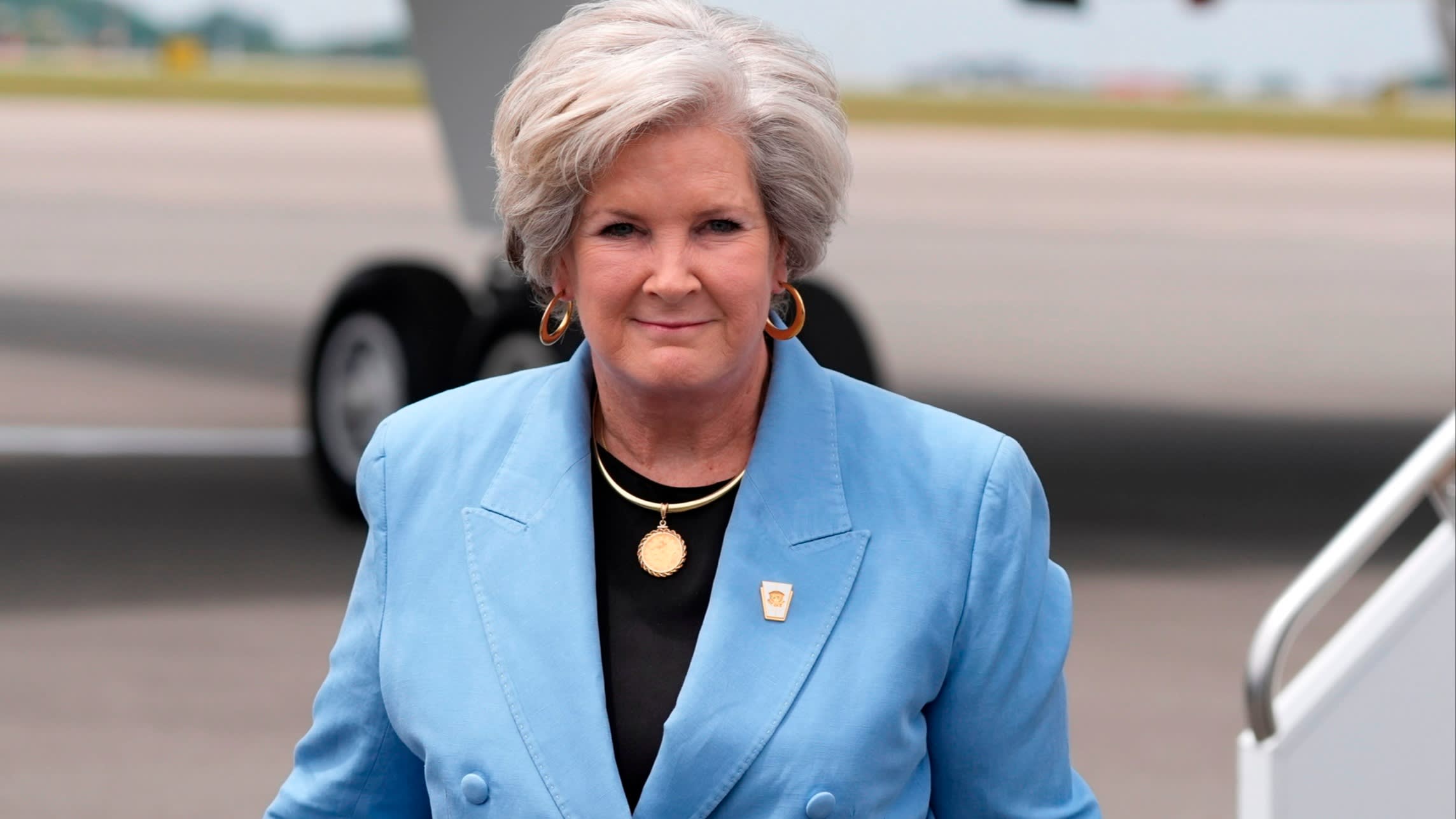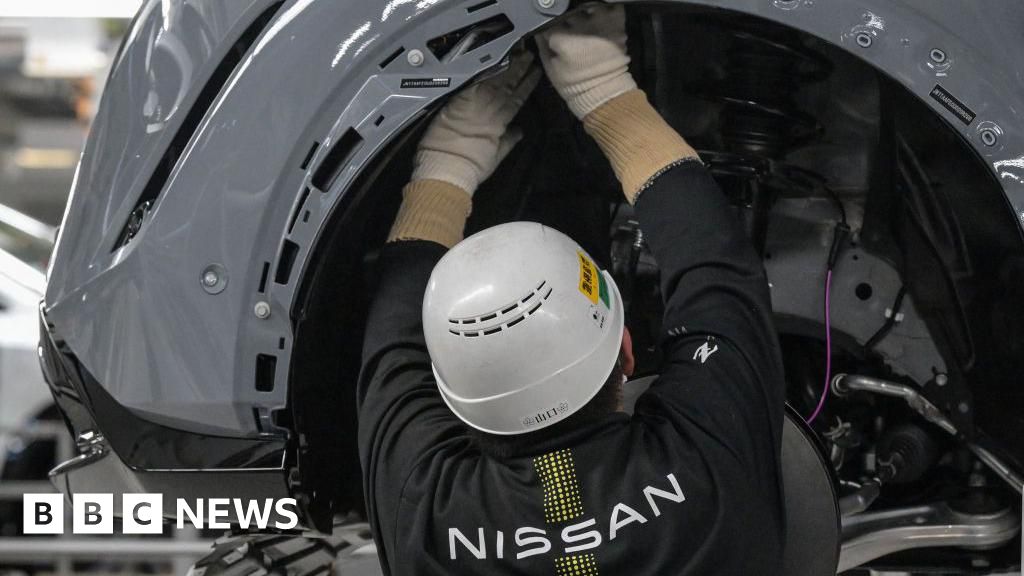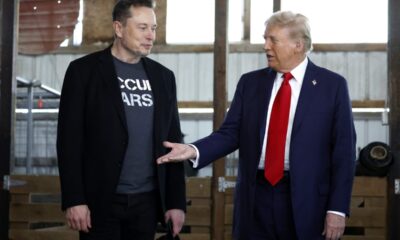This is an audio transcript of the Unhedged podcast episode: ‘The Trump economy. How big? How beautiful?’
Katie Martin
The people of America have spoken loudly and the choice is very, very clear. They want Donald Trump as their next president so high tariffs and mass deportations are the nation’s explicit choice of economic policy, possibly with a little executive branch influence over interest rates to boot.
[MUSIC PLAYING]
That smells pretty inflationary from here. So today on the show, we’re gonna make some economic market predictions that we hope will not make us look silly in a few months’ time. And if they do, we’ll just deny this podcast never happened.
This is Unhedged, the markets and finance podcast from the Financial Times and Pushkin. I’m Katie Martin, a markets columnist at FT HQ in relatively calm, serene London, joined down the line from New York City by the Unhedged newsletter crew: captain Robert Armstrong and first able deckhand Aiden Reiter.
Listeners, as a reminder, if you get confused, I’m the one with the English accent, Aiden is the young and clever one and Rob is Rob.
Guys, how’s it going?
Robert Armstrong
It’s going well. I’m not one of these people who gets all emotional about presidential elections, so.
Aiden Reiter
New York is very eerie right now. It’s like something’s not right, but nobody’s changing their behaviour.
Katie Martin
Let me tell you what is right. The good ship USA got this election done and dusted nice and quickly this time.
Robert Armstrong
Yeah. No, its good. And I think that is a huge relief.
Katie Martin
Yes, that is a massive relief.
Robert Armstrong
You know, just regardless of what you think about the person who won and the person who lost, man, the decision was clear. It was clear quickly. The system worked. No fuss, no muss.
Aiden Reiter
Yeah. In the pundit square of when there would have been huge upset, if Harris had won all of Trump’s supporters would have, you know, thrown a fit. If Trump had won the electoral college but not the popular vote, Harris’s voters would have thrown a fit. This was like the only outcome where everything is calm, I guess.
Katie Martin
Yeah. This is clear as day. And so, you know, Rob and I, we chatted about this actually the other day on the pod about how markets just don’t like this kind of I know what’s going on kind of situations. They like this kind of certainty. So just that is enough to add a certain amount to the stock market. And then also, let’s just have a quick kind of rattle through what markets have done since Donald Trump got re-elected.
Robert Armstrong
So that’s yesterday. What happened yesterday? S&P 500 was up 2.5 per cent. The Russell, which is small caps, was up six. That’s broadly as expected. Trump wants to . . .
Katie Martin
That’s a lot. Stocks like this.
Robert Armstrong
Yeah. Trump wants to cut corporate taxes in America. And if that happens, earnings go up. And so stock prices should rise. And it explains the difference between the small caps and the big caps. The Russell 2000 rose so much because they’re more domestically focused, so more of their revenue will be taxed at this lower rate we are currently imagining is going to become the corporate rate.
Aiden Reiter
Yeah. And there are certain sectors of stocks that did particularly well. So bank stocks soared, particularly Capital One and Discover, because their merger seems to potentially go through in a Trump administration; the Fannie Mae and Freddie Mac stocks. So stocks that theoretically Trump wants to give the profits back to shareholders also jumped. And then, you know, dollar stores did terribly poorly because . . .
Robert Armstrong
They import Chinese crap. And the Chinese tat tax, as you might call it in the UK.
Katie Martin
The crap tariff.
Robert Armstrong
The crap tariff is set to go up.
Aiden Reiter
Yeah. And homebuilders did terribly.
Robert Armstrong
Homebuilders did terribly.
Aiden Reiter
Because mortgages are probably gonna go up if you get inflation.
Katie Martin
Well, that brings me on to my next point, which is what we’ve had In addition to a really good day in the stock market. I refuse to talk about bitcoin, but I will just briefly note that it hit a record high. Trump likes crypto. Whatever. It’s stuff that doesn’t matter. But what we’ve also had is a really decent jump in the dollar and a big jump in bond yields, right? So bond prices have gone down, the yields have gone up. That is because the market thinks that Trump is inflationary. So my question to you guys is, is Trump inflationary?
Robert Armstrong
I would frame the question slightly differently. There’s one point.
Katie Martin
I’m asking the questions here.
Robert Armstrong
OK, OK. But just hear me out. Part of it is, is he inflationary and part of it is just, is he a higher yields guy? Is he a person of big tax cuts with no cuts in spending? And that means bigger deficits, sustained large deficits at the very least. And the result is that the long yield goes up, long bonds go down because the fiscal situation of the United States is worse. And then you can kind of pile the inflation point on top of that. If he does that kind of thing, this kind of thing tends to be inflationary, too.
Katie Martin
And in theory, if he does follow through on what he’s been saying he’s gonna do, which is to deport lots of migrants, then, you know, that starves the labour market of a source of really cheap labour for jobs that frankly, a lot of other people don’t want to do. And that should push up wages as well. So that’s also inflationary, right? So there’s a few angles where markets think this is gonna play in.
Here’s my thing though. Say he puts in these tariffs on the sort of scale he’s been talking about. He’s been talking about massive tariffs globally, particularly for China, but also globally. If you assume that the dollar runs higher at the same time, will that cancel out this effect? So, you know, say, you know . . .
Robert Armstrong
Good question.
Katie Martin
You have a TV that’s made out in South Korea, right? You get a 20 per cent tariff slapped on top of that the buyers in the US have to apply. But if the dollar is 20 per cent higher, does the consumer notice?
Robert Armstrong
Good point. Excellent point. Well, it will depend. I mean, the dollar going 20 per cent higher would be an epic move.
Aiden Reiter
And also, the rest of the world would implode.
Robert Armstrong
Right? Yeah. So, I mean, it’s a stretch, but I think what’s right about the argument you just made is that there are a lot of counterbalancing forces that could come into play here. Do you know what I mean? The global economy is very dynamic. So it’s not like Trump turns the tariff switch and prices just mechanically move higher by that amount. There’s all kinds of repercussions and feedback loops that you have to kind of think through.
Aiden Reiter
Yeah, but I think it’s fair to say that at least on the government spending point. So the bond yields, absolutely. That is his plan. And it seems like he’s gonna get a Republican Senate and a Republican House. So it’s likely that he will be able to pass the tax cuts, increase the spending that he wants. So the bond yields would rise on the deficit point. On inflation, immigration and tariffs, as Rob said, it gets much hazier.
Robert Armstrong
Yeah. But, you know, at a simple level, it’s like you take workers out of the economy, wages should go up. That’s what they taught me back in supply and demand school, you know.
Aiden Reiter
And if you make products more expensive, then prices go up.
Robert Armstrong
Yeah. And, you know, you could argue about to what degree this is a one-time effect. So it’s a step change versus you trigger a self-reinforcing cycle where you have persistent inflation. I think you can have that debate. But like at the most basic level, of course, these things are inflationary. And in the case of immigration, it’s designed to be inflationary. The whole reason that we want immigration down or those who want immigration to fall want immigration to fall is because they want pay for domestic workers to go up. We call that wage inflation. And when we were kids back in school, they told us that wage inflation is the kind of inflation that tends to persist and build on itself.
Aiden Reiter
I also get so frustrated with that step change versus not step change argument because at the end of the day, the prices will be higher. As we’ve learned in this election, Americans hate higher prices. So whether or not it’s a step change or persistent inflation, they’re gonna not like it.
Katie Martin
That’s exactly the point I was gonna make. Like, you know, so he’s painting himself into a corner, right? Inflation’s bad. He’s won this election in no small part due to inflation that kind of got embedded during the previous administration, but possibly he’s gonna make inflation worse. And also, he might seek a, you know, semi-official or official role of some kind relating to the Federal Reserve, might want more influence over interest rates. Help me out here.
Robert Armstrong
There is an important player in this drama who we haven’t mentioned. And while this person may not actually exist, she is worth mentioning and she is the bond vigilante, and one thing that I don’t think we tried to think through in the column yesterday, Aiden and I, but I think is interesting. So if all this stuff is true about Trump that we just went through — he’s inflationary, it’s higher rates — how do markets respond to that over time and how does Trump respond to the markets? So he just won an election and fair enough, by pointing out that there was a lot of inflation under Biden and that equals a bad economy. So what happens if the Trump-is-inflationary crowd is right and we have a significant increase in inflation and bond markets freak out and maybe stock markets don’t like it all that much either, right? And suddenly Trump, who likes to measure his success against the market, suddenly he’s in a situation of being criticised by the market. How is he gonna respond to that? How is he gonna respond to that? I don’t know. I have no idea.
Aiden Reiter
I mean, I think he has a pathological inability to accept blame so I’m sure someone else will be blamed for it.
Robert Armstrong
Yeah. But whoever he blames verbally, will his behaviour and the behaviour of the administration change? Like, would a proper bond vigilante freak-out and an accompanying disturbance in the stock market, would that scare a Trump administration into conventionality? I’m not saying that’s the most likely scenario, but I’m just putting it out there as something we ought to think about because he, you know, as we pointed out in the column yesterday, he had a nice ride from markets, 2017-21. Stock market very agreeable, rates low. It was pretty plain sailing. You can argue about whether he caused that or not. I’m always a little sceptical about the relationship between policy and markets. Fine. He had it good. How does he act when he has it bad vis-à-vis markets? Not that I’m saying he necessarily will, but these things have been known to happen.
Aiden Reiter
Yeah. And what we wrote about in the column yesterday is also, you know, the immigration and the tariff pieces also could not be as inflationary as the market’s expecting. And that depends, again, on how they actually go about doing this. There’s a lot of vagaries on the tariff policy. It might just be a negotiation tactic, in which case theoretically tariffs would become lower. I don’t think that’s the case. But that is what some people in his orbit say. And then the immigration stuff, right. If there’s massive unrest and if people aren’t happy, if the Republicans are unhappy that the person manicuring their lawn is no longer there or is demanding more money, how is that going to blow up in their face?
Katie Martin
So there’s a bunch of stuff that we don’t yet know around how this immigration policy is gonna actually play out, how this tariff policy is gonna play out. Let me throw at you another thing that we don’t know. Is Trump a strong dollar guy or a weak dollar guy? You know, so if we get to the point where all of this stuff is inflationary, it means that higher for longer is back. It potentially means we start to have a conversation again about US interest rates having to pick up rather than carry on falling. If this keeps pumping up the dollar, will he like that or will he discover pretty quickly that that’s actually bad for American exporters and actually try and turn it on its head?
Robert Armstrong
Let me make an apparently meaningless and empty terminological . . .
Katie Martin
It’s what you specialise at.
Robert Armstrong
This is what I specialise in. Trump will not perceive a stronger dollar as a stronger dollar. He will perceive it as other countries manipulating their currencies downward.
Katie Martin
He has (inaudible) of this, yes.
Robert Armstrong
And that is how he will frame that, right? So he likes, you know, he probably likes the word strong, right, especially when it’s associated with American things. And the dollar is an American, is a paradigmatically American thing. However, you know, a weak euro, a weak yen, a weak Rmb, these will be seen by him as evidence that other countries are cheating in their affairs with the United States. And I’m not saying that I’m not imagining this. This is in fact how he talks about this and has already talked about it.
Katie Martin
Yeah. He did this when he was last in office, like the European Central Bank cut interest rates for whatever reason, you know, as everyone expected they would. And he lashed out at them for manipulating the currency.
Robert Armstrong
Now, we know that a strong dollar and weak currencies elsewhere are just the same thing, right? But that’s not how he’s gonna frame it and he won’t act on that assumption.
Aiden Reiter
And, you know, because he doesn’t really value the independence of the Fed, or as we’re led to believe by a lot of his comments, I don’t think he’ll value the independence of other central banks in the same way.
Robert Armstrong
Yeah. So I think he is probably de facto a weak dollar guy, but that his policies are probably strong dollar.
Aiden Reiter
And also he has said even though he wants to be a weak dollar guy, he’s constantly touted how he wants the dollar to be at the centre of global commerce, as if it weren’t already the centre of global commerce. But he’s constantly said that, so that would imply a strong dollar policy.
Katie Martin
There’s so much going on here, you guys, so I’m gonna boil it down into a series of silly questions.
Robert Armstrong
Oh, goody.
Katie Martin
For you to answer.
Robert Armstrong
It’s my favourite kind of question.
Katie Martin
Yes. So on this issue of whether Trump is genuinely inflationary, you know, the dollar plays off against tariffs and is it all a wash, da da da da da — give me a prediction. Where is the US inflation rate at the end of 2025? You may pick your preferred inflation measure.
Robert Armstrong
I’m gonna say core PCE. PC inflation stands for inflation in personal consumption expenditures. And it’s the measure that the Fed prefers. It’s currently 2.65.
Aiden Reiter
2.65 core PCE.
Robert Armstrong
I will say a year from now it’s going to be . . . I think the over/under is actually 2.65, because I think if Trump is inflationary, it’s gonna take some time. And we’re in a drifting down part of inflation and we are not gonna have an inflation problem in the next year. This is what I fearlessly predict.
Katie Martin
I don’t understand your answer, though, Rob. So where is the end of next year?
Robert Armstrong
So it’s where it’s about where it is now. It’s above two and below three, right? You know, maybe a shade above two. If you want a number I’m gonna say that it’s at 2.3 at the end of the year.
Katie Martin
2.3. That’s a radical take. Aiden?
Aiden Reiter
Well, given that it theoretically could already be starting to reinflate now, I think that’s gonna be a little over. I’ll take the over, but maybe even significantly over. To me, what it depends on is I think these policies will be inflationary to some extent. The question is how fast can policies actually be put (overlapping speech)? The tariffs, if we really do believe these tariffs are part of some master scheme of negotiation, that will take a long time to negotiate every single tariff with every single country. So I imagine that (overlapping speech) might be at 20.5.
Robert Armstrong
Yeah. So we might wanna be asking, if I might be rude and reframe your question, what do we think is the peak inflation rate in Trump’s next term?
Aiden Reiter
Ah, there we go.
Robert Armstrong
How do you like that question, Aiden? First of all, let’s turn the question back on Katie. Katie, what is the peak year-over-year US core inflation rate under Donald Trump 2025-29?
Katie Martin
I will take 3.8.
Robert Armstrong
So you’re basically on my side. It’s warm, but not super warm.
Aiden Reiter
I’m here for 4.6.
Robert Armstrong
Wow. So if . . . OK, now . . .
Aiden Reiter
And that’s core. I think if you include oil, which I think will stay low for a long time.
Robert Armstrong
Yeah, yeah, that’s core.
Aiden Reiter
And that’s gonna be much lower. But core, which is unfortunately not what the American media pays attention to, will be much higher.
Robert Armstrong
It will be much higher. OK. Now, I’m with Katie. I think it’s gonna be cooler than that because I think in the end, a lot of these policies are not gonna get done, OK? I think that’s the central hypothesis. I think there’s a 60 per cent chance there’s a huge amount of hot air here. The other 40 per cent is a totally different picture. They may go bananas.
But if Aiden is correct and inflation gets to 4.6 per cent, that is gonna be wild, right, because then rates are high again, mortgages are more expensive. The whole narrative that it’s the Dems that caused inflation, that gets turned over; the politics is gonna be massive. He will have lost just because he’s, you know, all presidents lose the House in the first midterm. That will happen. So he won’t have Congress. And, you know, if in like, I don’t know, ’26, ’27, we have core inflation coming up against 5 per cent, it is gonna be lively as hell.
Katie Martin
So but wait, so what is your answer, Rob?
Robert Armstrong
No, I don’t think . . . I think my central hypothesis is just like yours, that it’s gonna be warm but not hot. If Aiden’s right, it’s gonna be wild times.
Aiden Reiter
But here’s the thing. I think that people’s feelings about the economy are hot air when it comes to Trump. I don’t think that . . . I guess I think there are a lot of people who have been really hurt by this economy and inflation has hurt a lot of households. And I think sometimes we do a disservice by talking about the average because there’s people on the bottom of the average and the top of the average. But I really do believe that the media system and the politics of this moment are not ones that will hold Trump to account if the economy gets bad.
Robert Armstrong
And now we come to the point where Aiden and I fundamentally disagree. I think if there is a serious increase in inflation, I think Trump will massively chicken out; that all the stuff we talked about him that is inflationary, when faced with the actual beast, it is my not very confident — I’m like 60-40, 70-30 — he just massively chickens out.
Aiden Reiter
I think he chickens out on some of it, the immigration stuff a little bit. But he hasn’t staked his campaign. The entire core policy promises of the campaign are tariffs, deportation and some form of tax cut. He’s gonna have to deliver on some regard on all three of them. The degrees might vary, but I really do believe it’s more a political statement than it is an economic concern at this point. I don’t think Donald Trump really cares that much about, you know, his supporters and their wallets. And I’m not the first person to say it.
Robert Armstrong
Yeah, no. I mean, you make a good case, but I’m taking the other side of it.
Katie Martin
I want to move on to my next question. Everyone’s talking about America all the time. Too much talking about America going on.
Aiden Reiter
I agree.
Katie Martin
But my next question, ironically, about America is where does the S&P 500 end up at the end of next year? So it’s had a good run on the back of Trump’s re-election. It’s now sort of 5,900 and something. Where does it end up at the end of next year?
Robert Armstrong
First of all, I don’t even wanna talk about my track record at predicting the markets.
Katie Martin
It is poor.
Robert Armstrong
It is terrible. But, you now, I just don’t see any . . . I mean, I think the market is expensive and has in a long run, so another huge leg up seems unlikely to me. But I don’t see any reason why valuations would crack or the economy would crack. So I think it’s gonna be up a kind of average amount, another 10 per cent, 6 per cent in real terms, something like that.
Aiden Reiter
I think the 2025 window also might be too soon, right? I’m sure they’ll get tax cuts which mechanically will feed into higher earnings.
Robert Armstrong
That’ll be . . . That’s like we talked . . . That got priced in already.
Aiden Reiter
That’s true. But I think if things were to hit the fan in terms of regulation and, you know, gutting the deep state in a way that actually feeds the market, that wouldn’t happen till 2026. So I agree that it will be only regularly up in 2025, but I think there is a real possibility that there is some pharmaceutical crisis and/or other crisis if . . .
Robert Armstrong
Pharmaceutical crisis?
Aiden Reiter
If RFK is in charge of all the health agencies, couldn’t you imagine some flow-through to tech and some flow-through to pharma companies?
Katie Martin
So give me a number.
Robert Armstrong
He also wants the fluoride taken out of the water. And so what the stock pick is like the company that makes dental equipment.
Aiden Reiter
You know, there’s that cool, fancy start-upy dentist place in New York City.
Robert Armstrong
Yeah. We have one next door here.
Aiden Reiter
We got to buy stock in that.
Robert Armstrong
Yeah.
Katie Martin
Beautiful. So give me a number. I’m saying 6,500 end of next year.
Robert Armstrong
OK, uh . . .
Aiden Reiter
I’ll just be slightly under to be annoying and do 6,300.
Robert Armstrong
5,929 times 1.1 equals . . . Did you get 6,500, Katie?
Katie Martin
Mm-hmm.
Robert Armstrong
We all agree. 6,500.
Katie Martin
Oh, for heaven’s sake.
Aiden Reiter
I’m taking the under, just to be annoying. 6,300.
Robert Armstrong
OK, great.
Katie Martin
OK. My final question for 10 points. Where do interest rates end up at the end of next year? And I don’t want you monkeying about with this question. End of next year, where are interest rates?
Robert Armstrong
Which interest rate are we talking about? Are we talking about the Fed fund rate?
Katie Martin
Exactly. So we’re currently at, where are we? A little under 5 per cent.
Robert Armstrong
The market has 3.7, I think. The futures market is telling us 3.7. I’ll take one less cut than that and go for . . . How do you like that? Fed funds rate of about 4.
Aiden Reiter
I’m gonna believe in the wisdom of the masses and say 3.75.
Katie Martin
Are you? Are you? I’m gonna say I don’t wanna agree with Rob, but I sort of agree with Rob. (Aiden laughs)
Robert Armstrong
Where are we now? Where are we now exactly? We’re at 4.75, right?
Aiden Reiter
Yeah. I could see four cuts before then. And I think inflation starts kicking, you know, becoming an issue until a little later into a Trump term.
Robert Armstrong
And the other thing about going with the market rating is one thing we really learned in this market, in this election is that markets are pretty good at predicting the future. Not great, but they did really well on this election. And so once again, we have an opportunity to honour markets in all their forms and their ability to aggregate many opinions into a sensible forecast for the future. Of course they get tonnes of stuff wrong, but it’s as good a mechanism as we have.
Katie Martin
Efficient markets, boys and girls. Now, on a related point, so my understanding is that whether he wants to or not, Donald Trump cannot unseat Jay Powell, who’s chairman of the Fed, until his term is up, which I think is sometime in 2026?
Robert Armstrong
Early in ’26.
Aiden Reiter
Yeah, February-ish.
Katie Martin
Does he reappoint him? If Powell wants to do it even, does he reappoint him? He’s a Trump appointee in the first place.
Aiden Reiter
I sincerely doubt Powell wants to do it again under a Trump administration. But, well, first of all, Trump apparently flirted with the idea of trying to fire him, but he was told that was not legally possible the first term.
Robert Armstrong
I don’t know, flirted. Flirted is I mean what we heard it was. He said he asked somebody if it was possible to fire him. And I’m sure he asked a lot of questions. But if things have been a bit hectic in markets in ’25, keeping him around might be something that they wanna do. So it depends a little bit. If you see turbulence ahead in markets, they may see the virtue in keeping the guy around. But if we have a smooth year, they’re gonna put somebody in there.
Aiden Reiter
I think of it as, you know, there’s two people who are flirted as contenders. There’s Kevin Hassett, who we’ve interviewed, and Kevin Warsh, and Kevin Warsh is seen as the more straight and narrow. He’s already been on the Fed. He’s, you know, more of a normal, you know, conservative guy. I feel like if things are good, he’ll nominate Kevin Hassett will be a little more to his liking. If things are bad, he’ll nominate Kevin Warsh.
Katie Martin
The battle of the Kevins. Yeah.
Robert Armstrong
I cannot offer any kind of scenario as detailed as that one, so I’m just gonna shut up, which is very unnatural to me.
Katie Martin
But look, I think we’ve, you know, we’ve given some straightforward answers and some not terribly straightforward answers. One last thing. Do we get a recession during Trump’s time?
Robert Armstrong
If I knew how to predict recessions, Katie, I wouldn’t be hanging around here talking to you, would I?
Katie Martin
Yeah, you would. You love it.
Robert Armstrong
(Laughter) Recessions are rare these days, right? I mean, it’s just a historical fact that recessions seem to come around less often these days. The rational thing to do faced with this question, if you had to put money on it, is to say no, because in an average four years at this point you don’t have a recession. Now, are there any reasons for us to push those odds up?
Aiden Reiter
So in my mind, if there is a recession, I don’t think it’ll be from natural economic occurrence. I think it’ll be from some unexpected Z factor . . .
Robert Armstrong
Exogenous.
Aiden Reiter
Exogenous effect like Covid or, you know, in Covid we had a mini-recession, right? So I imagine there being . . . Not I don’t want this to happen. I don’t think Trump will try to make this happen. I just I feel like we’re overdue at this point for something even worse.
Robert Armstrong
Yes. Mr Spooky.
Katie Martin
Yeah. I it feels incredibly unlikely to me. I think you can’t predict, you can’t bet on it. But if, you know, gun to my head, I would say nah, I can’t see it.
Robert Armstrong
Me too.
Aiden Reiter
I mean, I feel like you’re right. I just wanna take the over. So should I hand you money now? I mean . . . (Laughter)
[MUSIC PLAYING]
Robert Armstrong
(Laughter) We’ll talk about the odds later. On the next show we’ll discuss our recession odds.
Katie Martin
OK, look, we’ve put the world to right here, but we’re gonna be back in a sec with Long/Short.
Okey-doke, it’s time for Long/Short, that part of the show where we go long a thing we love, short a thing we hate. What do you guys got? I wanna go first. I am short incumbents. So where there’s been, there’s been loads of elections all over the world this year. And the incumbents in pretty much every case have lost votes or outright lost elections. So you look at the UK, you look at France, you look at Japan, you look at US. Moral of the story is inflation, man. Voters do not like it.
Robert Armstrong
Not one little bit.
Katie Martin
Not one bit. What you guys got?
Robert Armstrong
I am short the tweed industry (Aiden and Katie laugh) because I love tweed above all fabrics in all its varieties and permutations. However, it’s November in New York and it’s in the mid-70s. Global warming is real. Tweed is facing a very scratchy future.
Katie Martin
An existential crisis.
Robert Armstrong
Existential crisis. You know, it’s like in order to keep wearing tweed, I’m gonna have to move to like Sweden, you know. Then I might, actually, just so I can keep wearing tweed.
Katie Martin
As it happens. Yeah. Well, I wasn’t expecting that one, Rob. Good too. Thanks for playing. Aiden?
Aiden Reiter
I am long the American project. A lot of people were disappointed by the outcome of this election and have concerns about this next administration. But I believe that Americans will hopefully put their voices forward and America will continue to be a nation where a lot of people wanna live, and that gives people a brighter future than they otherwise would have.
Robert Armstrong
I will second you. America is awesome and will continue to be awesome.
Aiden Reiter
I’m hopeful.
Katie Martin
Good. Look, America being awesome, I can’t take the other side of that. Listeners, that’s it for today. But we are gonna be back in your feed and it’s gonna sound a little bit different. No spoilers, but you know, something exciting’s coming. So listen up next Tuesday.
Unhedged is produced by Jake Harper and edited by Bryant Urstadt. Our executive producer is Jacob Goldstein. We had additional help from Topher Forhecz. Cheryl Brumley is the FT’s global head of audio. Special thanks to Laura Clarke, Alastair Mackie, Gretta Cohn and Natalie Sadler.
FT premium subscribers can get the Unhedged newsletter for free. A 30-day free trial is available to everyone else. Just go to ft.com/unhedgedoffer.
I’m Katie Martin. Thanks for listening.
[MUSIC PLAYING]








































































































































































You must be logged in to post a comment Login